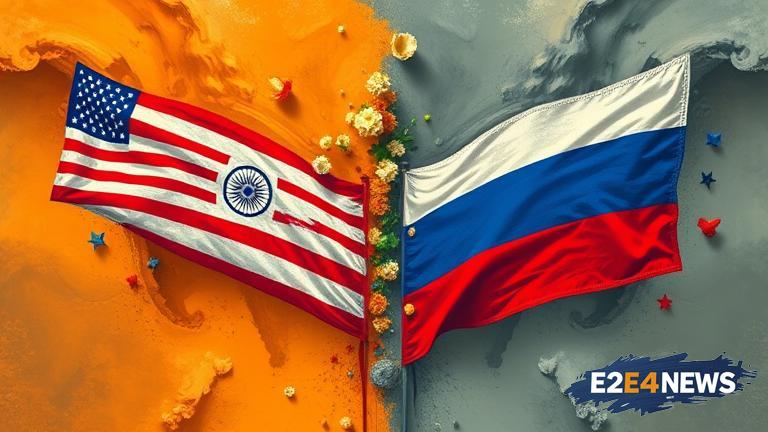The current global landscape is marked by escalating tensions between the United States and Russia, with India finding itself at the crossroads of this rivalry. As a significant player in global affairs, India’s diplomatic relationships with both the US and Russia are under scrutiny. The country has historically maintained good relations with Russia, with whom it shares a long-standing strategic partnership. However, in recent years, India has also been strengthening its ties with the US, with the two nations cooperating on various fronts, including defense and trade. This delicate balance has become increasingly challenging for India, as the US-Russia rivalry continues to intensify. The situation in Ukraine has further complicated matters, with the US imposing sanctions on Russia and India attempting to navigate this complex geopolitical landscape. India’s decision to purchase Russian oil and defense equipment has raised eyebrows in the US, with some viewing it as a sign of India’s closeness to Russia. Nevertheless, India has been keen to emphasize its commitment to diversifying its relationships and maintaining good ties with all major powers. The US, on the other hand, has been seeking to strengthen its partnership with India, viewing it as a crucial ally in the Indo-Pacific region. The two nations have been engaged in discussions on a range of issues, including trade, defense, and counter-terrorism. Despite these efforts, the US-Russia rivalry poses significant challenges for India, which must carefully balance its relationships with both nations. India’s foreign policy has traditionally been guided by the principles of non-alignment and strategic autonomy, and the country is keen to maintain this approach in the face of rising global tensions. The Indian government has been engaging in diplomatic efforts to strengthen its relationships with both the US and Russia, while also seeking to promote regional stability and security. The country has also been exploring opportunities for cooperation with other nations, including those in the European Union and the Association of Southeast Asian Nations (ASEAN). As the global landscape continues to evolve, India’s ability to navigate the complex web of relationships between major powers will be crucial in determining its position on the world stage. The country’s economic and strategic interests are closely tied to its relationships with the US and Russia, and India must carefully manage these relationships to achieve its goals. The US-Russia rivalry is likely to continue for the foreseeable future, and India must develop a nuanced and multi-faceted approach to managing its relationships with both nations. This will require careful diplomacy, strategic thinking, and a deep understanding of the complex geopolitical landscape. India’s success in navigating this challenging environment will have significant implications for its position in the world and its ability to achieve its strategic objectives. The country’s relationships with the US and Russia will be critical in determining its future trajectory, and India must be prepared to adapt and evolve in response to changing global circumstances. As the world becomes increasingly interconnected, India’s ability to manage its relationships with major powers will be crucial in promoting regional stability and security. The country’s diplomatic efforts will be closely watched by the international community, and India must be prepared to play a leadership role in promoting peace and stability in the region. In conclusion, India’s position in the midst of the US-Russia rivalry is complex and challenging, requiring careful diplomacy and strategic thinking. The country must balance its relationships with both nations, while also promoting regional stability and security. As the global landscape continues to evolve, India’s ability to navigate this complex environment will be crucial in determining its position on the world stage.





